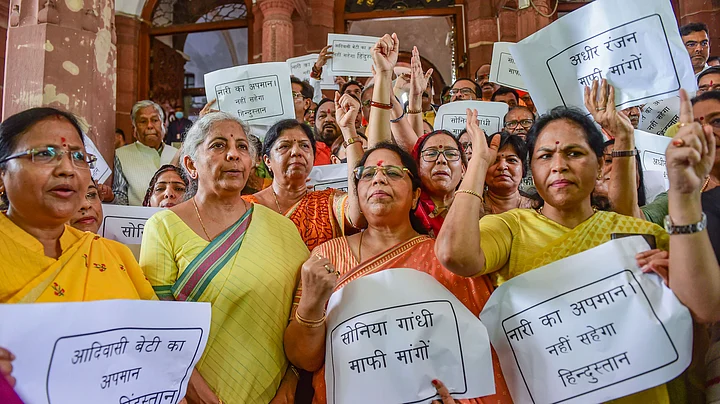Bharatiya Janata Party (BJP) MPs recently rose in an uproar in both Houses of Parliament after Congress’ Adhir Ranjan Chowdhury, in an alleged “slip of tongue,” called newly elected President Droupadi Murmu 'rashtrapatni.'
Union Minister Smriti Irani demanded an apology, not just from Chowdhury but from Congress chief Sonia Gandhi as well.
The new political row has also given rise to a discussion on how the president should be addressed when the post is held by a woman.
In fact, this has been debated in the Constituent Assembly earlier as well.
Objections have been raised on whether rashtrapati or rashtrapatni should be used. A section of the people believe that the form of address should be changed depending on whether the post is occupied by a man or woman.
Further, people have also reasoned that if the word pati is for a husband, then similarly the word rashtrapati is used for a man occupying the post.
On the other hand, netizens claim that only rashtrapati is used since India is a patriarchal and male-dominated country.
Debate Broke Out Even When Pratibha Patil Became President
During the Congress-led UPA government, when Pratibha Patil became the first woman president of the country, the same debate had broken out. Even then, the word rashtrapatni was raised but no one racked their brains over it. The use of 'Rashtra Mata' was also suggested, but several women activists objected to it saying that it will further India’s patriarchal mindset and gender discrimination.
In June 2007, in the Shiv Sena's mouthpiece Saamana, Balasaheb Thackeray had said, "I don't think there is a need to involve a husband or wife. Pratibha tai should be called the Rashtradhyaksh."
Debate Around the Word 'Rashtrapati' in the Constituent Assembly
Before drafting India’s Constitution, the Constituent Assembly was formed in which there were long discussions and debates on many subjects.
During a debate in December 1948, when the question of how to address the president came up, HV Kamath objected to a modification to the original draft that Jawaharlal Nehru had presented on 4 July 1947 and asked why Article 41 – “The Head of the Federation shall be the President (Rashtrapati)” – had been changed to “There shall be a President of India,” The Indian Express reported.
Kamath asked Dr BR Ambedkar why the word ‘Rashtrapati’ was deleted from the article in the draft Constitution. He wondered if it was because “we” have “cultivated a dislike – a new-fangled dislike of some Indian or Hindi words and try to avoid them as far as possible in the English Draft of the Constitution?”
Ambedkar explained that this happened (the word rashtrapati being dropped) as no prejudice was involved. He added that the change had happened because the committee preparing the draft Constitution in English had left it to those who were preparing the draft in Hindi and Hindustani to choose the corresponding word.
He further informed Kamath that while the draft in Hindustani used “President”, the one in Hindi used “Pradhan”. “And I am just now informed that in the Urdu Draft, the word used is Sardar,” Ambedkar told the Constituent Assembly.
Meaning of the Word 'Pati'
According to the Hindi dictionary, the word pati means malik (owner). When a word is prefixed with pati, the person is owner of the said object. Like crorepati, lakhpati, or rashtrapati – their meaning is not seen in the context of husband and wife.
At the same time, many words promote gender discrimination in society, such as batsman, cameraman, and so on. However, that is changing with time. Batsman is now batter and cameraman is now cameraperson.
(With inputs from The Indian Express.)
(At The Quint, we question everything. Play an active role in shaping our journalism by becoming a member today.)
